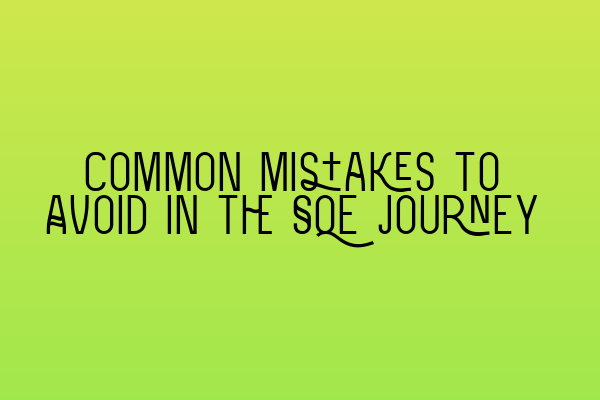Common Mistakes to Avoid in the SQE Journey
Are you currently preparing for the Solicitors Qualifying Exam (SQE) and feeling overwhelmed with the amount of information you need to learn? Don’t worry; you’re not alone. The SQE is a comprehensive exam that tests your knowledge and skills in various areas of law. To help you navigate through this challenging journey, we have compiled a list of common mistakes to avoid. By being aware of these potential pitfalls, you can increase your chances of success and make the most of your preparation time.
1. Lack of planning and organization: One of the biggest mistakes candidates make is not having a clear study plan or schedule. Without proper planning, it’s easy to get overwhelmed and lose track of what you need to cover. To avoid this, create a study timetable that breaks down each subject and topic into manageable chunks. This will help you stay on track and ensure that you cover all the necessary material before the exam.
2. Neglecting foundational knowledge: The SQE tests your understanding of legal principles and concepts. It’s essential to have a solid foundation in core areas of law before diving into more complex topics. Many candidates make the mistake of skipping over the basics and focusing solely on advanced topics. This can lead to a lack of understanding and difficulty in applying the law to practical scenarios. Be sure to allocate enough time to review fundamental principles and ensure you have a strong grasp of the basics.
3. Ignoring practice questions: Practice questions are an invaluable resource for SQE preparation. They help you familiarize yourself with the exam format and practice applying your knowledge to real-world scenarios. Some candidates overlook the importance of practice questions and focus solely on reading textbooks or attending lectures. While these resources are essential, it’s equally important to dedicate time to answering practice questions. This will improve your exam technique and help you identify areas where you may need further study.
4. Lack of time management: Time management is crucial when sitting for the SQE. The exam is divided into multiple sections, each with a specific time limit. Candidates often make the mistake of spending too much time on certain questions, leaving insufficient time for others. To avoid this, practice timed practice exams and learn to allocate your time wisely. Familiarize yourself with the structure of the exam and understand how much time you should spend on each section. This will help you pace yourself during the actual exam and ensure that you complete all the questions within the allocated time.
5. Neglecting legal research skills: The SQE requires candidates to demonstrate their ability to conduct legal research. Many candidates focus solely on memorizing legal principles and neglect honing their research skills. Understanding how to use legal databases, navigate case law, and conduct effective legal research is crucial for success in the SQE. Dedicate time to develop your legal research skills and familiarize yourself with the available legal resources.
6. Not seeking professional guidance: The SQE is a challenging exam, and self-study is not always enough. Many candidates make the mistake of solely relying on their own resources and not seeking professional guidance. Working with a qualified solicitor, attending preparatory courses, or joining study groups can significantly enhance your understanding and performance. Don’t hesitate to reach out for assistance and guidance from professionals who have experience in SQE preparation.
7. Neglecting revision and exam technique: Revision is just as important as initial learning. Some candidates make the mistake of dedicating all their time to studying new topics, without setting aside time for revision. Regularly reviewing and reinforcing the material you have already covered is essential for long-term retention. Additionally, practicing past exams and developing effective exam techniques will improve your confidence and performance during the actual SQE.
By avoiding these common mistakes, you can optimize your SQE preparation and increase your chances of success. Remember to plan and organize your study time, focus on building a strong foundation of knowledge, practice answering past exam questions, manage your time effectively, develop your legal research skills, seek professional guidance when needed, and prioritize revision and effective exam technique.
For more information on specific topics related to the SQE, check out these related articles:
– Key Topics in SQE Land Law: A Roadmap to Exam Success
– Planning Permission and Land Use: Legal Requirements and Considerations
– SQE Prep: Essential Tips and Resources for Success in Property Practice
– Examining Land Charges: Implications and Considerations
– Understanding Landlord Responsibilities in the UK: Legal Obligations Explained
Remember, the SQE journey may be challenging, but with the right approach and dedication, you can achieve your goal of becoming a qualified solicitor. Good luck with your preparation!

Leave a Reply